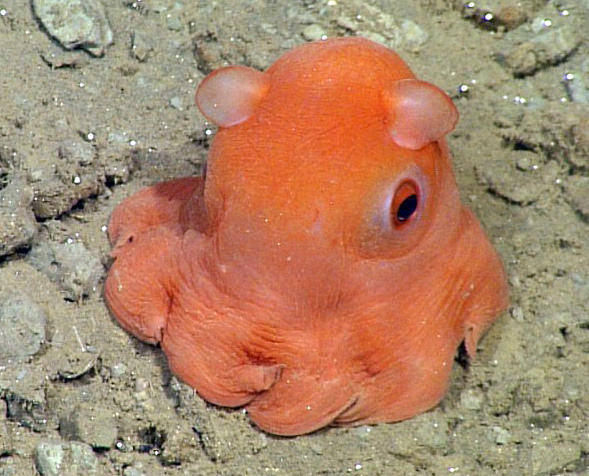
This flapjack octopus in the genus Opisthoteuthis was photographed 330 meters (about 1,080 feet) below the surface in Monterey Bay. (2013 MBARI)
A California researcher at the Monterey Bay Aquarium Research Institute may have discovered a new species of octopus, and is considering naming it with a title that conveys how adorable it is.
“As someone that’s describing the species you get to pick what the specific name is,” Stephanie Bush, postdoctoral fellow at the Monterey Bay Aquarium Research Institute (MBARI), told Science Friday this week. “One of the thoughts I had was making it Opisthoteuthis adorabilis — because they’re really cute.”
Scientists originally believed this unclassified mollusk and the Opisthoteuthis californian (that many have seen as the pink flapjack octopus in the Pixar film Finding Nemo) were the same species. When Bush began working on the Monterey Bay Aquarium’s Tentacles exhibit (still on display) last year, she noticed several key distinctions, and realized she was working with two different species of octopus altogether.
Opisthoteuthis specimens were first collected in 1990, and live in the deep sea along the California coast at up to 1,500 feet deep. Their body measures about 7 inches in diameter, and its tentacles are webbed, giving it the appearance of an umbrella when spread out along the seafloor. These octopus swim by moving their fins, pulsing their webbed arms, pushing water through their funnel for jet propulsion, or all three at once. The octopus often swim up off the bottom and hover a bit just above the seafloor, looking for small crustaceans, worms, and other food. The thing that makes this octopus especially unique—and cute—is its puppy dog eyes, which Bush says, are unusually large for the size of its small body.
Being able to personally name a new species is an honor among the scientific community. The rule is that anytime someone finds an animal, vegetable or mineral new to science, the discoverer, like Stephanie Bush, has the privilege of giving it a name. The process of naming a new species is complicated and can take many years to accomplish, however. The species naming process typically takes a year or longer to complete, as the scientific process of careful research, paper submission, and review for publication is very involved.
